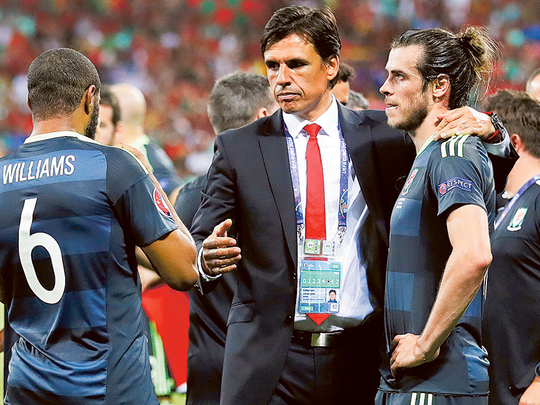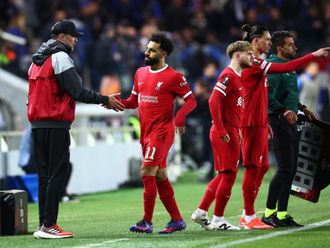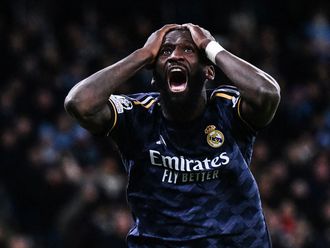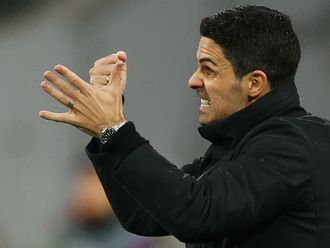
Cardiff: Chris Coleman’s status as a Welsh hero is secure. But it all very nearly unravelled, back in September 2012, when mere qualification for a major tournament looked distant, never mind reaching the semi-finals.
That was when Wales lost 6-1 to Serbia during World Cup qualification, and Coleman seriously considered leaving the post he had taken eight months earlier. “I had doubts whether I was capable of doing the job,” he said last year. “We didn’t just lose in Serbia, we embarrassed ourselves. But I think I’d have been a bit of a coward if I’d walked away.”
It is all very different now. Coleman, continuing Gary Speed’s work, has moulded a side who long ago cast off the lazy idea that they were a one-man team, surrounding Gareth Bale with a cast of characters who are undoubtedly supporting but not subservient. In most circumstances, the “Together, stronger” slogan that the Football Association of Wales has pushed might be regarded as a tiresome marketing gimmick, but in this case it happens to be true.
That all seems to come from the manager. Something that repeatedly comes up when listening to people talk about Coleman is that he does not treat Wales like an international team. He has fostered a “club” mentality, to the point it sometimes seems that these are Wales players who are simply loaned to an assortment of domestic teams for the rest of the season.
“If he’d treated Wales like an international set-up it wouldn’t have worked,” says Clinton Morrison, who played under Coleman at Coventry City. “It would’ve been too strict, too serious. All the players have got smiles on their faces. When they score, they’re all off the bench together, even if they’ve not had a game so far. That’s unusual, because some people will always be disappointed they’ve had no time on the pitch. That all comes from the management.”
Alan Smith knows Coleman better than most. He bought Coleman for Crystal Palace aged 19 and has worked with him, on and off, ever since. Even in those early days there was something in Coleman that seemingly informs how he manages Wales. “I wouldn’t go so far as to say [there was a manager in him] in those early days,” says Smith.
“But he was certainly a leader, and always respected in the changing room. He understood the ethos of a team.” Coleman’s record in club football was, to be charitable, patchy: he was sacked, perhaps harshly in some cases, at Fulham, Real Sociedad and Coventry, so what has changed since then, and why has he been so successful with Wales?
Smith believes it could simply be a question of a man thrown into management at a very young age (he was only 32 when he took the Fulham job) growing with time, learning from his mistakes and thinking more clearly. “I think he’s more confident and has matured since those early days,” says Smith. “When he was at Fulham, and then when he went to Coventry, I don’t think he was great at always getting the right staff around him. I think there was a thought that: ‘If I can get a mate to come along with me, I’ll be all right.’ But he’s become very good at selecting a good working staff [with Wales].”
It is also possible he simply was not well-suited to some aspects of club management. “If he had a weakness in those days it was the Monday to Friday churn of the job,” says Smith, “but on a Tuesday or Saturday, when we had a game, he’d be brilliant in the changing room.”
The absence of a day-to-day grind that many managers seem to miss when away from clubs seems to be a positive for Coleman: with Wales he has the players so infrequently that almost every day is a Tuesday or Saturday.
“Even if you weren’t in the team you still felt part of it,” says Morrison, “because he made you feel part of it. One-to-one, he had great man-management. You’d go into his office angry [at not being in the team] but come out happy after what he’d said. He’d make you feel six feet taller. He always knew the right things to say.”
That is apparent in the way the Wales players talk about him too. “He is a good motivator,” the captain, Ashley Williams, said recently. “That is the main thing. By the time you leave the changing room you are ready to go into battle. He doesn’t make long speeches ... when you look at the guy you can tell he means everything he says. It comes from the heart.”
— Guardian Media Limited, London 2016












